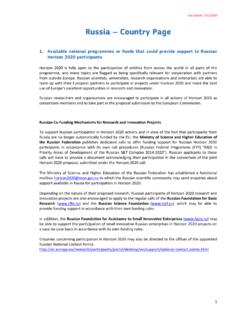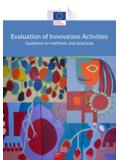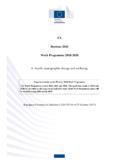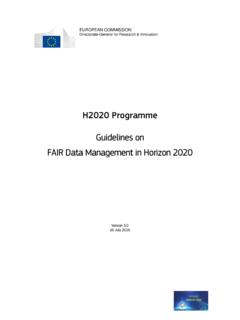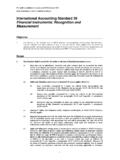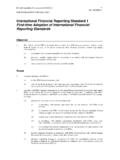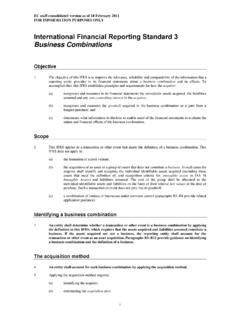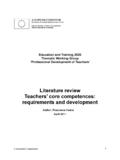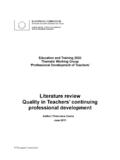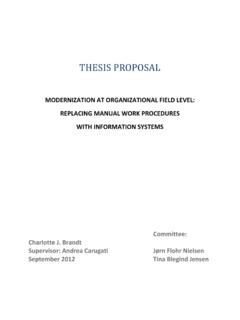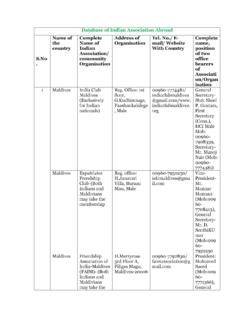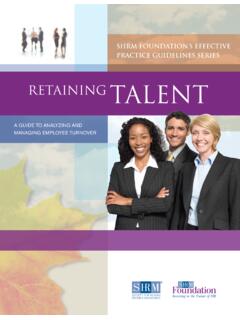Transcription of Artificial Intelligence in Society - European Commission
1 Artificial Intelligence in SocietyArtificial Intelligence in SocietyArtificial Intelligence in SocietyThis document, as well as any data and any map included herein, are without prejudiceto the status of or sovereignty over any territory, to the delimitation of internationalfrontiers and boundaries and to the name of any territory, city or cite this publication as:OECD (2019), Artificial Intelligence in Society , OECD Publishing, Paris, 978-92-64-58254-5 (print)ISBN 978-92-64-54519-9 (pdf)The statistical data for Israel are supplied by and under the responsibility of the relevant Israeli authorities. The use ofsuch data by the OECD is without prejudice to the status of the Golan Heights, East Jerusalem and Israeli settlements inthe West Bank under the terms of international credits: Cover Adobe to OECD publications may be found on line at: OECD 2019 You can copy, download or print OECD content for your own use, and you can include excerpts from OECD publications, databases andmultimedia products in your own documents, presentations, blogs, websites and teaching materials, provided that suitableacknowledgement of OECD as source and copyright owner is given.
2 All requests for public or commercial use and translation rights shouldbe submitted to Requests for permission to photocopy portions of this material for public or commercial use shall beaddressed directly to the Copyright Clearance Center (CCC) at or the Centre fran ais d exploitation du droit de copie(CFC) at 3 Artificial Intelligence IN Society OECD 2019 Preface Artificial Intelligence (AI) is reshaping economies, promising to generate productivity gains, improve efficiency and lower costs. It contributes to better lives and helps people make better predictions and more informed decisions.
3 These technologies, however, are still in their infancy, and there remains much promise for AI to address global challenges and promote innovation and growth. As AI s impacts permeate our societies, its transformational power must be put at the service of people and the planet. At the same time, AI is also fuelling anxieties and ethical concerns. There are questions about the trustworthiness of AI systems, including the dangers of codifying and reinforcing existing biases, such as those related to gender and race, or of infringing on human rights and values, such as privacy. Concerns are growing about AI systems exacerbating inequality, climate change, market concentration and the digital divide.
4 No single country or actor has all the answers to these challenges. We therefore need international co-operation and multi-stakeholder responses to guide the development and use of AI for the wider good. This book, Artificial Intelligence in Society , examines the AI landscape and highlights key policy questions. Its goal is to help build a shared understanding of AI in the present and near term, and to encourage a broad dialogue on important policy issues, such as labour market developments and upskilling for the digital age; privacy; accountability of AI-powered decisions; and the responsibility, security and safety questions that AI generates.
5 The book draws on the work of the AI group of experts at the OECD, formed in 2018 to scope principles to facilitate innovation, adoption and trust in AI. Their debates inspired the OECD Recommendation of the Council on Artificial Intelligence the first intergovernmental standard on AI adopted by all OECD members and by several partner countries on 22 May 2019. This work emphasises the need for international co-operation to shape a policy environment that fosters trust in and adoption of AI. Looking ahead, we must progress together on AI-related technical, ethical and legal issues, in order to foster the alignment of standards and codes of conduct while ensuring the inter-operability of laws and regulations.
6 This is urgent, given the speed of developments and the breadth of applications. It is thus no surprise that AI is a top priority on national and international agendas including in the G7 and G20. Adoption of the Recommendation and creation of a global dialogue are vital first steps. But there is much more to be done. With the establishment of the OECD AI Policy Observatory later this year, we are bringing our analytical, measurement and policy expertise to bear on largely uncharted territory. The Observatory an inclusive hub for public policy on AI will help countries encourage, nurture and monitor the responsible development of trustworthy AI systems for the benefit of Society .
7 4 PREFACE Artificial Intelligence IN Society OECD 2019 Moving forward, the OECD is gearing up to move from principles to action. We are determined to help countries implement the Recommendation to ensure that our societies and economies harness the full promise of AI, sharing its benefits broadly and putting the right safeguards in place so that no one is left behind now and for generations to come. Angel Gurr a Secretary-General OECDFOREWORD 5 Artificial Intelligence IN Society OECD 2019 Foreword This book aims to help build a shared understanding of Artificial Intelligence (AI) in the present and near term.
8 The book maps the economic and social impacts of AI technologies and applications and their policy implications, presenting evidence and policy options. It is also intended to help co-ordination and consistency with discussions in other international fora, notably the G7, the G20, the European Union and the United Nations. The book builds on the OECD October 2017 Conference AI: Intelligent Machines, Smart Policies ( ); on the activities and discussions of the AI Group of experts at the OECD (AIGO) from September 2018 through February 2019; and on the OECD Recommendation of the Council on Artificial Intelligence .
9 In turn, it has contributed to the OECD Going Digital project and the OECD s publication Going Digital: Shaping Policies, Improving Lives. Chapter 1, The AI technical landscape , provides a historical overview of AI s evolution from the development of symbolic AI in the 1950 s to recent achievements in machine learning. It presents the work of the OECD s AI Group of Experts (AIGO) to describe AI systems that predict, recommend or decide an outcome to influence the environment and their lifecycle. The chapter also proposes a research taxonomy to help policy makers understand AI trends and identify policy issues.
10 Chapter 2, The AI economic landscape , discusses AI s role as a new general-purpose technology that can lower the cost of prediction and enable better decisions. Complementary investments in data, skills and digitalised workflows are required, as is the capacity to adapt organisational processes. The chapter also reviews trends in private equity investment in AI start-ups. Chapter 3, AI applications , considers ten areas that are experiencing rapid uptake of AI technologies transport, agriculture, finance, marketing and advertising, science, health, criminal justice, security, the public sector and augmented/virtual reality.
